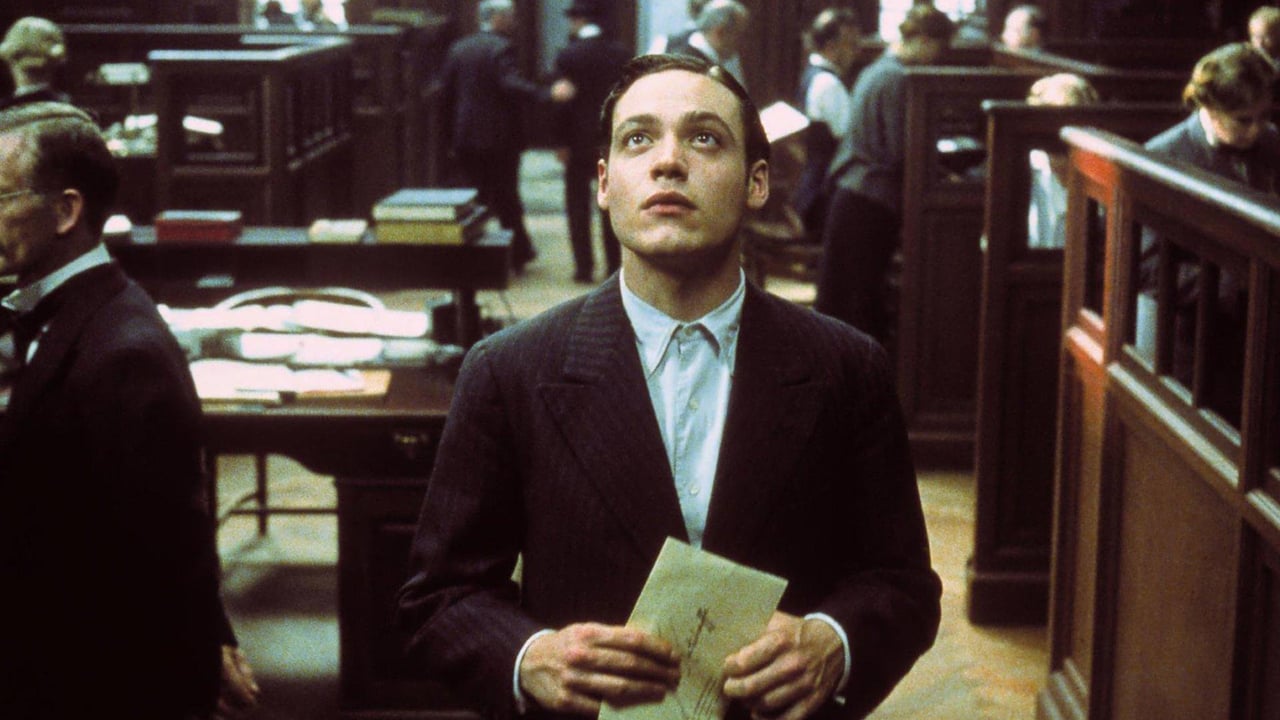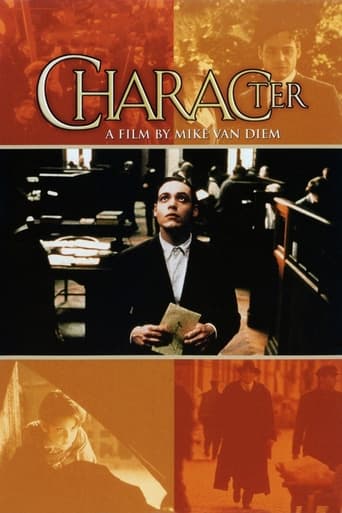

Truly Dreadful Film
... View MoreThe film's masterful storytelling did its job. The message was clear. No need to overdo.
... View MoreOne of the most extraordinary films you will see this year. Take that as you want.
... View MoreThis is one of the best movies I’ve seen in a very long time. You have to go and see this on the big screen.
... View MoreYou will enjoy this movie if you really into drama. One might confuse of why this movie categorize as mystery at first from reading the plot of Karakter. The plot has said it all, young lawyer, mute mother, ruthless father, both tormenting the protagonist all his life, but the young lawyer turn out to be successful.This is one of the best drama that based on ordinary circumstances, but the way it presented makes it an interesting story. The truth is I have known what was happening in the film, because coincidently it's similar to my personal situation. Nevertheless, the movie still captivated me until the end.Now where is the mystery in this film? You will know later that the mystery is the two characters. His father and his mother. They both will makes the film interesting until it finish. This is the type of mystery, where you know who are the mystery, but the mystery itself is inside them. Thus, this is why the film is an excellent drama.If you to watch movie that both entertaining and have impact to your real life, then this is for you. This is a movie that can relate to your life. It will bring out only the positive of you.
... View MoreKarakter is one of those films that if you don't understand it, you will never learn to appreciate it. Essentially, it is about Jacob Katadreuffe (Fedja van Huet) who was forsaken by his formidable father Dreverhaven (Jan Decleir) when he was only a baby and used his own talents and hard work to attain a higher station in life. But it is about much more than that. It is about real human beings who struggle with themselves and with each other in order to make sense out of their own lives and to find their place in dynamic, puritan universe that is Holland.Dreverhaven hates his son Jacob, because the latter reminds him of the one great sin he committed in his life -- namely, having an affair with a woman who was not his wife. This may seem surprising, because Dreverhaven had a fearsome reputation for physically throwing out tenants who could not pay their rent and taking to court those who defaulted on his loans. Yet, Dreverhaven lived in a puritanical world where making wealth by hard work, discipline and sheer ruthlessness was considered a virtue, while having children out of wedlock was not. Since he succeeded in that world more than most other people, he was changed by it in a more profound way. But Dreverhaven was also capable of changing more positive ways. He develops a respect for Jacob, when his son triumphantly overcomes the challenges he puts before him. Dreverhaven's respect for his son conflicts with his hatred of him and he never seems able to reconcile the two emotional impulses.Then we have Jacob Katadreuffe who knows what grinding poverty feels like, especially when his mother (Tamar van den Dop) decides the time has come for him to move out. As it turns out, his mother was on the right track. Jacob was cleverer than his peers. He learnt the English language simply by reading books he found in his new house. Informed by a friend that the Communists were gaining new members, Jacob observed that unemployment was up as well -- he obviously knew that most people would leave the Communist party once they found jobs that paid the rent and other living expenses. After a business reversal (which taught him how businessmen cheat each other), Jacob Katadreuffer finally begins his meteoric rise to prominence only to come into conflict -- by a strange and unexpected twist of fate -- with his father Dreverhaven.Finally, we have a murder mystery. Dreverhaven was found in the basement of his wear house with a knife lodged in his stomach and his estranged son, Jacob Katadreuffe, was the last person known to have seen him.Over the course of the film, director Max van Diem brilliantly interweaves these three strands together. He is assisted by a very capable group of actors. Jan Decleir is absolutely brilliant as Dreverhaven, who is a special kind of villain, because he has depth, a soul and inspires a certain degree of sympathy. Dreverhaven is probably one of the hardest roles to play, but Jan Decleir pulls it off without a hitch. Fedja van Huet is also impressive as Jacob Katadreuffe, a man so consumed with ambition that he makes no room for any real personal life. Towards the end, one feels he may become the same man his father was. Van den Dop also gives a fine performance as the reserved and quiet mother to Jacob. Finally, Paleis van Boem's riveting score really contributes to the plot and the general atmosphere of the film. These days, it is rare to see a film about real people trying to work out their own internal and external conflicts. They do so without special effects, without explosions and for the most part without violence. This is one of the most interesting and intense films I have seen in recent times and it is tragic that Hollywood does not make more films like this one.
... View MoreThis was a great film and was also my first exposure to Dutch cinema. The film is sort of like a combination of David Copperfield, Les Miserables and a murder mystery! The film starts with an argument. You have no idea who the two people are and it culminates with one of them being accused by the police of killing the other. I was completely taken by surprise by the direction the movie took from there as was told in a series of flashbacks and it became like a Horatio Alger film about an ambitious but poor man working hard to succeed. One of the other main characters is an apparently sadistic and rigid man (who seems a lot like Inspector Javert from Les Miserables). Throughout much of the movie, he appears to be quite misunderstood by the ambitious young guy (who, it turns out is the "bad guy's" bastard son). To me, this disturbed and bitter old man was the most interesting element in the story. The young guy was driven by success and anger towards his biological father--that is clear. But the complex and odd motivations of the father are much less clear and open to debate--and THAT'S what helps make this a stand-out movie to me.NOTE for parents. This movie is rated R--mostly for some violence and a brief distant shot of a naked man. I would not have been surprised if it had been rated PG-13, as the violence was not that intense and the nudity was neither gratuitous or overly explicit. This film would probably be okay for a mature teenager to watch.
... View MoreThis is a movie that grips right away. While it has a dark setting, sparse but classic, the characters are rich. The love and care that Mike van Diem and the actors put in this film is visible. Thanks to significant contributions from both Dutch and Belgian TV stations, this movie is a rare treat, which is for once not spoiled by overly commercial requirements from demanding advertisers... As i understand, the film company First Floor Features had this film for decade(s?) in the planning, and it is a happy coincidence that it was realized the way you can enjoy it now. It has thus become a monument honoring the fabulous writer F. Bordewijk, the Dutch life and mind of the beginning 1900's, the craftsmanship of a dedicated cast, and a generous producer. Jan Declair as the stony-hearted usher Dreverhaven is a character you won't forget for a long time. His softer side is time and again rejected by taciturn Joba, his former housekeeper who became pregnant in one lonely weak moment of them both. For several years, he offers her to marry her, or at least to contribute for the upbringing of his illegitimate son Kattedreuffe. She as many times rejects: 'We do not need anything.' On a precarious occasion, Dreverhaven denounces Jacob Kattadreuffe nevertheless, and from that moment on, father and son have a harsh relation as well. -Masterfully, fate intertwines their lives, as the story unfolds. Real gems are present everywhere, the scenery is breathtakingly picturesque, partly filmed in Rotterdam harbor, and in other places like Poland. The movie constantly plays with time, but in a plausible way. As an example, when Kattedreuffe has an appointment at a bailiff's office after being framed into bankruptcy, the name plate blinks at once with his own name on it. And indeed, he starts a career in this very office that same day. For a while, the lives of father and son seem only occasionally to coincide, but it is a silence before the storm. Every picture draws to the dramatic end which was glimpsed as the opening scene: Did Kattadreuffe murder Dreverhaven? Many instances shown would allow this conclusion, as the two fatally attract each other to fulfill their inner tragedy. Dreverhaven as this hard and desperate 'keeper of the law' who can not express love, and Kattadreuffe as the one who had to fight his whole life to arrive in a higher position, and then stands empty-handed, his love unreturned through his own stupidity (even his mother sees that Lorna Te George / Tamar van den Dop was an exquisite relation missed). To kill (!) each other would suddenly seem like the best possibility and a liberation in such a dark hour, but the end has a surprise. The last minute smooths all the giant waves, and allows for a satisfying and ingenuous end scene. - Maybe you have to see this movie more than once to uncover the many hidden treasures, i strongly recommend to get it for yourself on DVD. The music of 'Paleis van Boem' enhances perfectly the impressive scenery. It is an artwork that has more than earned the Oscar it has got as best foreign film in 1998, along with several other awards.And i am proud to have been asked to participate with calligraphy and handwritten material, although it is only clearly visible in the last half minute when (my) hand writes the last words of the testament, undersigning with - (see for yourself!).
... View More